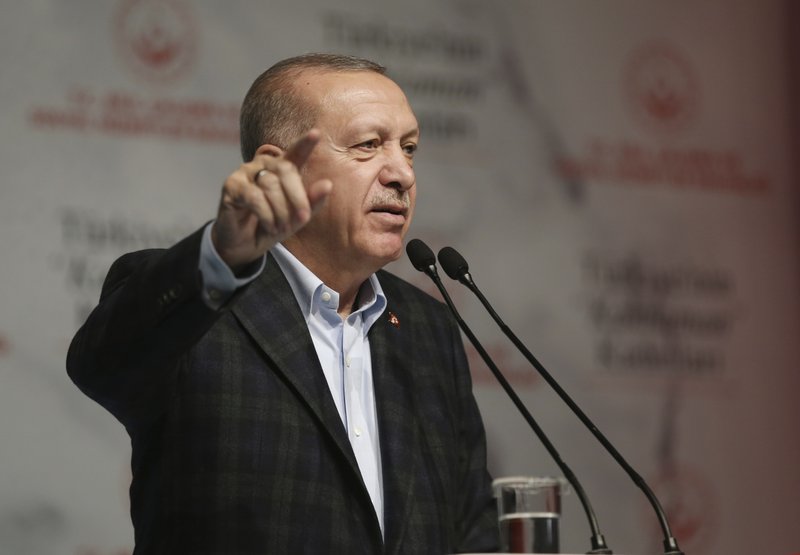Turkish President Recep Tayyip Erdogan will visit Brussels on Monday for talks with European Union officials amid a standoff between Ankara and Brussels over sharing of responsibility for refugees and migrants.
Thousands of migrants have massed at Turkey’s land border with EU-member Greece after Erdogan’s government made good on a long-standing threat and announced that Turkey — which is home to more than 3.5 million Syrian refugees — would no longer prevent migrants and refugees from crossing into EU countries.
There have been no reports of migrants massing at Turkey’s border with EU-member Bulgaria, with the issue concentrated at Greek borders.
Erdogan has demanded Europe shoulder more of the burden of caring for refugees. He has accused the EU of not meeting its obligations, including failing to pay money promised to Turkey under a 2016 EU-Turkish deal to stem the flow of migrants to Europe. The EU says it is disbursing the funds.
The Turkish leader is scheduled to meet with European Council President Charles Michel and European Commission President Ursula von der Leyen to discuss the 2016 deal. Erdogan was also scheduled to meet with NATO chief Jens Stoltenberg, his office said.
The 2016 deal, which slashed the number of migrants arriving in Europe, called for Turkey to halt the flow of Europe-bound migrants and refugees in exchange for up to 6 billion euros ($6.7 billion) in aid for Syrian refugees on its territory, fast-track EU membership and visa-free travel to Europe for Turkish citizens.
A high-level Turkish official said the sides would discuss a possible revision of the 2016 deal. It wasn’t clear if an agreement would emerge on Monday. The official spoke on condition of anonymity in line with government rules.
Von der Leyen said the meeting would be the “restart of a dialogue.” She repeated that the EU has the obligation to protect its borders, but also to guarantee the fundamental individual right for asylum.
Topics on the table would include regional stability, reducing tensions and pressure at the Greece-Turkey border, and Syria, she said.
Erdogan was also expected to raise concerns over alleged violence carried out by Greek authorities as they push back the migrants.
Greece has deployed riot police and border guards to repel people trying to enter the country and the Greek border area has since seen violent confrontations between them and the migrants. On Saturday, youths threw rocks at Greek police and tried to pull down a border fence.
Many migrants have alleged mistreatment in the hands of Greek police, and Turkey says two migrants were killed in violence along the border. Greece has denied the accusations.
EU foreign ministers have criticized Turkey, saying it is using the migrants’ desperation “for political purposes.” EU countries are still dealing with the political fallout from a wave of mass migration five years ago.
Thousands of migrants have slept in terrible conditions in makeshift camps near the Greek border since the Turkish government said they were free to go, waiting for the opportunity to enter Greece.
Tens of thousands of migrants were already in Greece before Turkey announced its borders open in the last days of February. Many are housed in massively overcrowded camps on Greek islands, where they first arrive from the Turkish coast. Part of the 2016 EU-Turkey deal stipulates new arrivals must remain on the islands pending deportation unless they successfully apply for asylum in Greece.
Germany’s coalition government said after an overnight meeting early Monday that the country was willing to “support Greece regarding the difficult humanitarian situation of about 1,000 to 1,500 children on the Greek islands.”
The government said Germany could host children in dire need of medical treatment or those who are unattended minors and younger than 14, especially girls. It didn’t say exactly how many children Germany would take, but said an agreement regarding children would be negotiated by a European “coalition of the willing” in coming days.
Greek Prime Minister Kyriakos Mitsotakis will visit Berlin Monday and Tuesday for talks.
German Foreign Minister Heiko Maas said Monday that Germany wouldn’t accept Turkey using people as a bargaining chips.
“Europe’s message to Turkey is clear: We stand by a fair burden-sharing, but we do not accept that people, who are already in a desperate situation, are being abused as bargaining chips on top of this,” Maas said in an interview published Monday by newspaper group Funke Mediengruppe.
“A negotiation strategy on the backs of the weakest will not lead to the desired results. We will never refuse talks when there are financial gaps when it comes to life-saving humanitarian care of refugees … But that requires that Turkey keeps up it’s part of the agreements.” he said.
The situation on the Greek-Turkish land border was generally calm Monday morning. Greek authorities said in the 24 hours between Sunday and Monday morning, they had blocked 1,646 attempts to cross the border and arrested two people — one Moroccan and one Egyptian.








































admin in: How the Muslim Brotherhood betrayed Saudi Arabia?
Great article with insight ...
https://www.viagrapascherfr.com/achat-sildenafil-pfizer-tarif/ in: Cross-region cooperation between anti-terrorism agencies needed
Hello there, just became aware of your blog through Google, and found ...